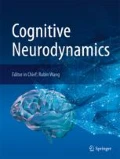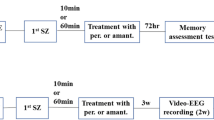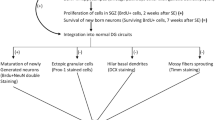Abstract
Patients with temporal lobe epilepsy (TLE) often display cognitive deficits. However, current epilepsy therapeutic interventions mainly aim at how to reduce the frequency and degree of epileptic seizures. Recovery of cognitive impairment is not attended enough, resulting in the lack of effective approaches in this respect. In the pilocarpine-induced temporal lobe epilepsy rat model, memory impairment has been classically reported. Here we evaluated spatial cognition changes at different epileptogenesis stages in rats of this model and explored the effects of long-term Mozart music exposure on the recovery of cognitive ability. Our results showed that pilocarpine rats suffered persisting cognitive impairment during epileptogenesis. Interestingly, we found that Mozart music exposure can significantly enhance cognitive ability in epileptic rats, and music intervention may be more effective for improving cognitive function during the early stages after Status epilepticus. These findings strongly suggest that Mozart music may help to promote the recovery of cognitive damage due to seizure activities, which provides a novel intervention strategy to diminish cognitive deficits in TLE patients.



Similar content being viewed by others
References
Aldenkamp A, Arends J (2004) The relative influence of epileptic EEG discharges, short nonconvulsive seizures, and type of epilepsy on cognitive function. Epilepsia 45:54–63
Aoun P, Jones T, Shaw GL, Bodner M (2005) Long-term enhancement of maze learning in mice via a generalized Mozart effect. Neurol Res 27:791–796
Bodner M, Muftuler LT, Nalcioglu O et al (2001) FMRI study relevant to the Mozart effect: brain areas involved in spatial-temporal reasoning. Neurol Res 23:683–690
Bridgett DJ, Cuevas J (2000) Effects of listening to Mozart and Bach on the performance of a mathematical test. Percept Mot Skills 90(3):1171–1175
Brown SR (2013) Emergence in the central nervous system. Cogn Neurodyn 7(3):173–195
Caldwell GN, Riby LM (2006) The effect of music exposure and own genre preference on conscious and unconscious cognitive processes: a pilot ERP study. Conscious Cognit 16:992–996
Castren E, Zafra F, Thoenen H et al (1992) Light regulates expression of brain-derived neurotrophic factor mRNA in rat visual cortex. Proc Natl Acad Sci USA 89(20):9444–9448
Chauvière L, Rafrafi N, Thinus-Blanc C et al (2009) Early deficits in spatial memory and theta rhythm in experimental temporal lobe epilepsy. J Neurosci 29(17):5402–5410
Chikahisa S, Sei H, Morishima M et al (2006) Exposure to music in the perinatal period enhances learning performance and alters BDNF/TrkB signaling in mice as adults. Behav Brain Res 169(2):312–319
Curia G, Longo D, Biagini G et al (2008) The pilocarpine model of temporal lobe epilepsy. J Neurosci Methods 172:143–157
Drane DL, Meador KJ (2002) Cognitive and behavioral effects of antiepileptic drugs. Epilepsy Behav 3(5 Suppl):S49–S53
Eichenbaum H (1999) Conscious awareness, memory and the hippocampus. Nat Neurosci 2:775–776
Faure JB, Akimana G, Carneiro JE et al (2013) A comprehensive behavioral evaluation in the lithium–pilocarpine model in rats: effects of carisbamate administration during status epilepticus. Epilepsia 54:1203–1213
Foster NA, Valentine ER (2001) The effect of auditory stimulation on autobiographical recall in dementia. Exp Aging Res 27:215–228
Howe AG, Levy WB (2007) A hippocampal model predicts a fluctuating phase transition when learning certain trace conditioning paradigms. Cogn Neurodyn 1(2):143–155
Hughes JR (2001) The Mozart effect. Epilepsy Behav 2(5):396–417
Hughes JR, Daaboul Y, Fino JJ et al (1998) The ‘Mozart effect’ on epileptiform activity. Clin Electroencephgr 29(3):109–119
Ivanov VK, Geake JG (2003) The Mozart effect and primary school children. Psychol Music 31:405–413
Jokeit H, Luerding R, Ebner A (2000) Cognitive impairment in temporal-lobe epilepsy. Lancet 355:1018–1019
Kim H, Lee MH, Chang HK et al (2006) Influence of prenatal noise and music on the spatial memory and neurogenesis in the hippocampus of developing rats. Brain Dev 28(2):109–114
Kuester G, Rios L, Ortiz A et al (2010) Effect of music on the recovery of a patient with refractory nonconvulsive status epilepticus. Epilepsy Behav 18(4):491–493
Lin LC, Lee WT, Wu HC (2010) Mozart K.448 and epileptiform discharges: effect of ratio of lower to higher harmonics. Epilepsy Res 89:238–245
Lin LC, Lee WT, Wang CH et al (2011a) Mozart K.448 acts as a potential add-on therapy in children with refractory epilepsy. Epilepsy Behav 20:490–493
Lin LC, Lee WT, Wu HC et al (2011b) The long-term effect of listening to Mozart K.448 decreases epileptiform discharges in children with epilepsy. Epilepsy Behav 21(4):420–424
Lin LC, Juan CT, Chang HW et al (2013) Mozart K.448 attenuates spontaneous absence seizure and related high-voltage rhythmic spike discharges in Long Evans rats. Epilepsy Res 104(3):234–240
Lin L-C, Ouyang C-S, Chiang C-T et al (2014) Listening to Mozart K.448 decreases electroencephalography oscillatory power associated with an increase in sympathetic tone in adults: a post-intervention study. J R Soc Med Open 5(10):1–7
Maguire J (2012) Music and epilepsy: a critical review. Epilepsia 53(6):947–961
Marques CM, Caboclo LO, da Silva TI et al (2007) Cognitive decline in temporal lobe epilepsy due to unilateral hippocampal sclerosis. Epilepsy Behav 10:477–485
Meador KJ (2002) Cognitive outcomes and predictive factors in epilepsy. Neurology 58(Suppl 5):S21–S26
Meador KJ (2006) Cognitive and memory effects of the new antiepileptic drugs. Epilepsy Res 68:63–67
Meador KJ, Gilliam FG, Kanner AM et al (2001) Cognitive and behavioral effects of antiepileptic drugs. Epilepsy Behav 2(4 Suppl):SS1–SS17
Morimoto K, Fahnestock M, Racine RJ (2004) Kindling and status epilepticus models of epilepsy: rewiring the brain. Prog Neurobiol 73:1–60
Özdemir HH, Kara M, Yumrutas O et al (2014) Determination of the effects on learning and memory performance and related gene expressions of clothianidin in rat models. Cogn Neurodyn 8(5):411–416
Pacchetti C, Mancini F, Aglieri R (2000) Active music therapy in Parkinson’s disease: an integrative method for motor and emotional rehabilitation. Psychosom Med 62:386–393
Racine RJ (1972) Modification of seizure activity by electrical stimulation: II. Motor seizure. Electroencephalogr Clin Neurophysiol 32(3):281–284
Raglio A, Farina E, Giovagnoli AR (2014) Can music therapy alleviate psychological, cognitive, and behavioral impairment in epilepsy? Epilepsy Behav 31:7–8
Rauscher FH (1993) Music and spatial task performance. Nature 365:611
Rauscher FH, Robinson KD, Jens JJ (1998) Improved maze learning through early music exposure in rats. Neurol Res 20:427–432
Rutten A, Van Albada M, Silveira DC et al (2002) Memory impairment followingstatus epilepticus in immature rats: time-course and environmental effects. Eur J Neurosci 16(3):501–513
Sack O (2006) The power of music. Brain 129:2528–2832
Särkämö T, Tervaniemi M, Laitinen S et al (2008) Music listening enhances cognitive recovery and mood after middle cerebral artery stroke. Brain 131(3):866–876
Seth AK (2008) Causal networks in simulated neural systems. Cogn Neurodyn 2(1):49–64
Tellez-Zenteno JF, Hernandez-Ronquillo L (2012) A review of the epidemiology of temporal lobe epilepsy. Epilepsy Res Treat 12:1–5
Turner RP (2004) The acute effect of music on interictal epileptiform discharges. Epilepsy Behav 5:662–668
Turski WA, Cavalheiro EA, Schwarz M et al (1983) Limbic seizures produced by pilocarpine in rats: a behavioral, electroencephalographic and neuropathological study. Behav Brain Res 9:315–335
Van Praag H, Kempermann G, Gage FH (2000) Neural consequences of environmental enrichment. Nat Rev Neurosci 1:191–198
Wagatsuma H, Yamaguchi Y (2007) Neural dynamics of the cognitive map in the hippocampus. Cogn Neurodyn 1(2):119–141
Wieser HG (2004) ILAE Commission on Neurosurgery of Epilepsy. ILAE Commission Report. Mesial temporal lobe epilepsy with hippocampal sclerosis. Epilepsia 45:695–714
Zhang S (2015) Improvement of cognitive impairment and hallucination by pharmacological and non-pharmacological therapies for a parkinsonism’s disease with dementia. J Neurol Stroke 2(2):00049
Acknowledgments
This work was supported by the National Natural Science Foundation of China (No. 81371636, 81071222, and 61201278), the 111 Project (B12027) and the PCSIRT project. This study was also funded by the Scientific and Technological Research program of Chongqing Municipal Education Commission (No. KJ121309).
Author information
Authors and Affiliations
Corresponding author
Rights and permissions
About this article
Cite this article
Xing, Y., Qin, Y., Jing, W. et al. Exposure to Mozart music reduces cognitive impairment in pilocarpine-induced status epilepticus rats. Cogn Neurodyn 10, 23–30 (2016). https://doi.org/10.1007/s11571-015-9361-1
Received:
Revised:
Accepted:
Published:
Issue Date:
DOI: https://doi.org/10.1007/s11571-015-9361-1




